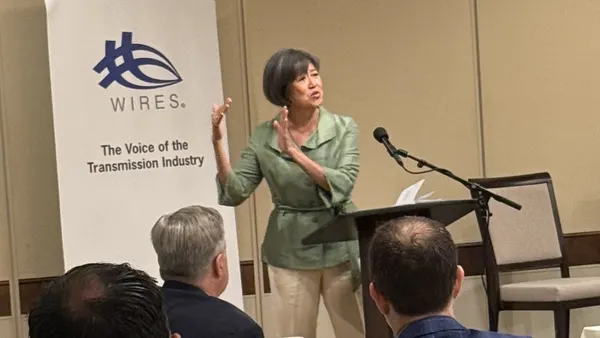Dive Brief:
- NextEra Energy on Monday filed for a rehearing on its proposal to purchase Oncor Electric, saying that Texas state regulators broke the law in their "arbitrary and capricious" denial of the $18.7 billion deal last month.
- The filing identifies 14 "points of error" the company claims the Public Utilities Commission of Texas made in evaluating the deal, including mistakes in risk assumptions, an unlawful expansion of the PUC's jurisdiction and the violation of NextEra's "constitutional rights of due process and equal protection."
- The filing did not soften NextEra's position on key regulatory priorities — like an independent Oncor board and enhanced ring fencing procedures — the PUC said would be necessary to approve the acquisition on appeal. Regulators have 30 days to decide whether to grant the application for rehearing.
Dive Insight:
When Texas regulators rejected NextEra's attempt to purchase Oncor from its bankrupt parent, Energy Future Holdings, they gave the Florida-based company a clear indication of how to proceed.
Commissioners identified two sticking points responsible for the rejection. In addition to a call for an independent board of directors for the Dallas-based utility, regulators also voiced concern over NextEra's plan to eliminate "ring fencing" provisions that seal a parent company's finances off from their subsidiaries.
When EFH went belly-up in 2014, it was ring fencing provisions that saved Texas's largest distribution utility from "financial calamity," regulators wrote. But the most important of those provisions were precisely "the two provisions that NextEra Energy seeks to eliminate" in its merger application.
Those points remain non-negotiable for NextEra, however, with CEO Jim Robo saying on an earnings call last month that accepting them would be "bad business"
"Obviously we can't pay $18.7 billion for utility that we can't run. And we can't control the board and we can't have access to dividends," he said.
Instead, the company launched a frontal assault on the PUC's rejection order, saying the decision violated state law and the company's constitutional due process rights. In particular, NextEra argued the regulators devised a "new, more stringent public interest standard" that required showing "unique" benefits "exclusive" to the transaction.
"The order represents an expansion of power that exceeds the limits set by the Legislature and the bounds of the Commission's own precedent," company lawyers wrote.
The PUCT's rejection of NextEra's acquisition was the second time it turned away an offer to purchase Oncor.
A 2015 proposal would have allowed real estate firm Hunt Consolidated to purchase Oncor and convert it into a Real Estate Investment Trust. While the REIT structure is common in other industries, no utility of Oncor's size had attempted it, and Hunt withdrew its application after the PUC attached financial stipulations on the deal.
The rejection was also NextEra's second failed merger attempt in as many years. Last July, Hawaii regulators rejected the company's proposal to buy Hawaiian Electric Industries, the parent company of the state's dominant utilities. An upstart utility holding company is now vying to purchase the troubled island power provider.












